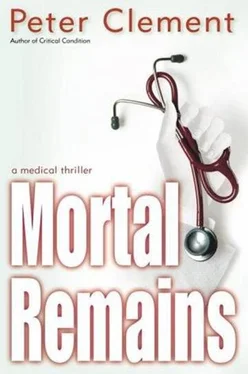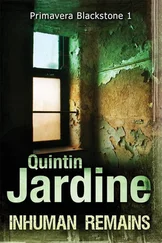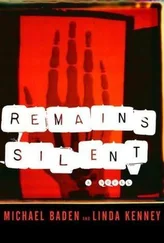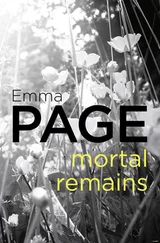Peter Clement - Mortal Remains
Здесь есть возможность читать онлайн «Peter Clement - Mortal Remains» весь текст электронной книги совершенно бесплатно (целиком полную версию без сокращений). В некоторых случаях можно слушать аудио, скачать через торрент в формате fb2 и присутствует краткое содержание. Жанр: Триллер, на английском языке. Описание произведения, (предисловие) а так же отзывы посетителей доступны на портале библиотеки ЛибКат.
- Название:Mortal Remains
- Автор:
- Жанр:
- Год:неизвестен
- ISBN:нет данных
- Рейтинг книги:3 / 5. Голосов: 1
-
Избранное:Добавить в избранное
- Отзывы:
-
Ваша оценка:
- 60
- 1
- 2
- 3
- 4
- 5
Mortal Remains: краткое содержание, описание и аннотация
Предлагаем к чтению аннотацию, описание, краткое содержание или предисловие (зависит от того, что написал сам автор книги «Mortal Remains»). Если вы не нашли необходимую информацию о книге — напишите в комментариях, мы постараемся отыскать её.
Mortal Remains — читать онлайн бесплатно полную книгу (весь текст) целиком
Ниже представлен текст книги, разбитый по страницам. Система сохранения места последней прочитанной страницы, позволяет с удобством читать онлайн бесплатно книгу «Mortal Remains», без необходимости каждый раз заново искать на чём Вы остановились. Поставьте закладку, и сможете в любой момент перейти на страницу, на которой закончили чтение.
Интервал:
Закладка:
Pretty fuckin’ furtive, thought Donna, intrigued enough by what she’d just seen to forget the urgency of her previous problem.
She had her own small light to get around, a tiny red bulb on her key chain, and used it to make her way to the computer where the visitor had been working. Entering the access code, she clicked up the most recently viewed page.
Whoever it was had been after the preliminary culture results of specimens currently being incubated in the lab. Scrolling down the screen she saw:
Neisseria gonorrhea.
Streptococcus pneumoniae.
Staphylococcus aureus.
From her studies, Donna knew they were nasty bugs, but nothing out of the ordinary for a hospital.
Campylobacter jejuni.
A commonplace pathogen ingested from undercooked beef or chicken that could cause enteritis, or the runs. Easily treated with ciprofloxacin.
Salmonella.
Shigella.
More serious causes for the runs. Quick to act, would have victims shitting blood, but again, readily treated.
Escherichia coli 0157:H7.
Oh, oh. This one was trouble.
Her memory spit out the pathogenesis. As few as ten organisms could cause an infection. The symptoms were puking and pouring out bloody diarrhea within forty-eight hours. But it was the toxins released by these particular bacteria that could really hit the victim. Ten percent of the time they produced a nightmare condition called hemolytic uremic syndrome by attaching themselves to receptor sites on the inside surface of a patient’s blood vessels. This would cause red cells to rupture, platelets to fall, bleeding to increase, kidneys to fail, and the brain to seize. Once it got that far, the victim had a 50 percent chance of ending up on dialysis and at least a 5 percent chance of winding up on a slab in the morgue. For Escherichia coli 0157:H7 was the organism responsible for what the media called Toxic Hamburger Disease , but it could also be transmitted in water.
At least, that was what she remembered reading in her books.
Troubled, she went over to check out the incubator. Everything seemed in order. But other than going through each culture to see which had had a scoop removed, there was no way of knowing which dish had been sampled, or why, or even if there was anything amiss in what had been done. Perhaps it was only a graduate student doing research who needed a specimen of a particular organism for some project.
One thing was certain, she wasn’t going to say anything. Otherwise, she’d have to explain why she’d been in here.
Her beeper went off, and she jumped, the high-pitched signal splitting through the quiet like a burglar alarm. The tiny message plate indicated the telephone number for ER. They’d need bloods drawn and analyzed or urines spun and looked at under a microscope.
But first, she had to find a bathroom. And her glasses.
Chapter 10
Later that same morning, Tuesday, November 20, 8:10 A.M.
Geriatric Wing,
New York City Hospital
The aroma of a geriatric ward in the morning always got to Earl. It wasn’t just the hint of human waste mingled with the smells of coffee, eggs, bacon, or other offerings on the breakfast menu – he encountered those every day in ER. It was the staleness of the air. It seemed as locked in as the patients, and had both a sour and soapy-sweet odor that hung heavy, a pungent reminder of failing flesh.
As he made his way toward the reception desk through the flow of orderlies, nurses, and elderly patients, a young woman of medium height dressed in a jogging outfit stepped up to him and eyed his identity badge. “Ah, Dr. Garnet. I’ve been expecting you.”
Her shaved haircut made him wonder if she’d either had chemo, treated herself for lice, or done a recent stint in the Marines. Her ID read NURSE TANYA WOZCEK.
“Hi,” he said, shaking her hand. “Are you one of the people taking care of Bessie McDonald?” From her civies he figured she was off duty.
“Yes, I’m also the only staff person willing to talk with you. Want a coffee?”
“What?”
“Do you want a coffee?”
“No, I mean yes , I do. But what’s this about there being no one else-”
“First, I suggest you see Bessie and speak with the resident who was on duty the night she became comatose. He’s with her now.” Without giving him a chance to reply, she led the way down the hallway, navigating between the shuffling men and women in housecoats, most inching along with the aid of walkers. “You and I can speak afterward,” she added, glancing back at him over her shoulder.
“But what about the other nurses-”
“Everyone knows you’re investigating something in connection with Kelly McShane’s murder and that it involves Chaz Braden. They aren’t willing to speak out and risk his reprisals.”
Caught off guard, Earl reflexively went on the offensive. “Who told you such nonsense?” Damn that talkative Lena Downie. She must have spilled the beans after all. So much for keeping his interest in the case on the quiet side. But maybe he could still bluff it out. “That kind of rumor is far from helpful-”
“Come off it. We figured it out as soon as the request to see Bessie’s charts for 1974 came through. Since Chaz Braden was her doctor at the time, and the coroner who made the application for the files is the one investigating the killing – it wasn’t hard. What we can’t put together is the tie-in between Kelly’s death and Bessie.”
“Oh?” It was all he could think of to say.
She punched in a code on an electronic lock and let them into a small kitchen. Within minutes he had a styrofoam cup filled to the brim with steaming black sludge – what his residents would have called a real stomach-stripper. Not even a triple milk and double sugar helped tame it any. He took a sip to be polite, trying hard not to wince.
“I want you to know Bessie was fine when I went off duty that night,” she said, pouring a coffee for herself.
“Okay,” he said, indicating with a shrug she should elaborate as they continued down the corridor.
“It doesn’t strike you as odd? The newspaper article confirms that Kelly’s remains are found, and within twenty-four hours, Bessie is in a coma.”
“Now wait a minute. Surely you’re not insinuating-”
“I don’t like coincidences!” She ran a hand over the stubble on her scalp. “Especially convenient ones.”
Earl didn’t like coincidences either. Most doctors didn’t. But he’d also an ingrained aversion to melodrama. “If you’re suggesting what I think, isn’t it a little over the top?” He’d lowered his voice, passing a couple of nurses who seemed to have stopped what they were doing and grown very quiet. “Could we perhaps have this conversation where it’s a little more private?”
Tanya’s drawn face relaxed into a smile. “Of course. Sorry.” She turned her attention to the gray, loose-skinned inhabitants who wandered the place like ghosts, greeting them by their first names as she made her way along the corridor.
An old lady, drooped over in a wheelchair and mumbling to herself, lifted her head and responded, “Morning, Tanya.” A food-spattered hospital gown lay draped over her like a drop cloth.
An elderly man wearing oversize trousers held up by red suspenders leaned against the wall, his hands resting on the head of his cane. He gazed blankly at her, clearly not recognizing who she was, or perhaps it was the sound of his own name he found perplexing.
All along the hallway wrinkled features brightened into wispy, almost hopeful smiles, as if the sound of someone calling them had penetrated the gray limbo where they lived and ignited the flicker of a shared dream. At last someone they knew had come here and would take them home, back to where they could remember.
Читать дальшеИнтервал:
Закладка:
Похожие книги на «Mortal Remains»
Представляем Вашему вниманию похожие книги на «Mortal Remains» списком для выбора. Мы отобрали схожую по названию и смыслу литературу в надежде предоставить читателям больше вариантов отыскать новые, интересные, ещё непрочитанные произведения.
Обсуждение, отзывы о книге «Mortal Remains» и просто собственные мнения читателей. Оставьте ваши комментарии, напишите, что Вы думаете о произведении, его смысле или главных героях. Укажите что конкретно понравилось, а что нет, и почему Вы так считаете.












